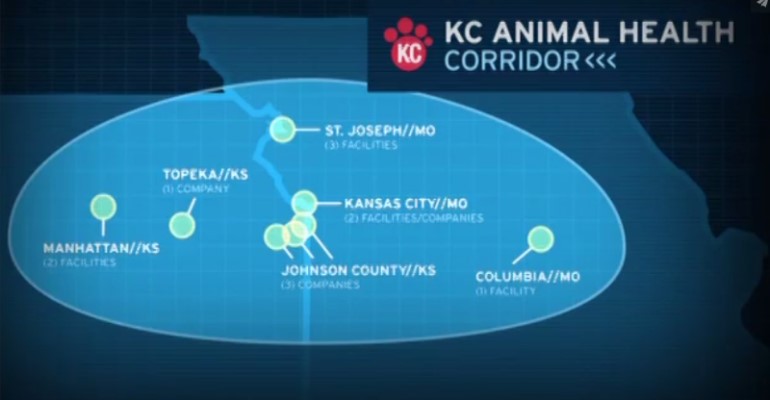Final Kansas City location determined for ERS, NIFA
USDA signs lease for downtown Kansas City, Mo., to house relocated ERS and NIFA agencies.

It has been a month since the relocated offices of the U.S. Department of Agriculture’s Economic Research Service (ERS) and National Institute of Food & Agriculture (NIFA) reported for work in the Kansas City region. On Thursday, USDA announced that it signed a lease for permanent office space at 805 Pennsylvania Ave. in downtown Kansas City, Mo., to serve as the new home to the two agencies, which were uprooted from their previous locations in Washington., D.C.
The uncertainty of the final office location – whether on the Kansas or Missouri side of the Greater Kansas City region – caused many employees to hesitate on making the move. In a statement, Agriculture Secretary Sonny Perdue said the announcement of the permanent home for ERS and NIFA will “provide clarity on commute times and work/life balance for our employees.”
Perdue added, “The region is not only a hub for agriculture in America’s heartland but is also already proving to be a diverse talent pool in proximity to many land-grant and research universities. I’m confident Kansas City will continue to be a great home for the future of ERS and NIFA.”
In August 2018, Perdue announced the relocation plans, and by May, the Kansas City region was selected, but a permanent location was not named. Since Sept. 30, 2019 -- the first day to report for work as part of the relocation efforts -- both agencies have been housed in USDA’s Beacon Center and will remain in that space until the build-out of the permanent office is completed.
The move has brought an intense amount of opposition from past administrators as well as lawmakers on Capitol Hill. At a House biotechnology, horticulture and research subcommittee hearing earlier in October, discussion on the ERS and NIFA move to Kansas City dominated the hearing. Subcommittee chair Stacey Plaskett (D., V.I.) noted that 214 of the 329 appropriated positions at ERS are vacant. NIFA has 264 vacant positions out of 336 funded positions. USDA deputy undersecretary for research, education and economics Scott Hutchins noted that the hiring process has "accelerated tremendously."
An August 2019 report from the USDA Inspector General concluded that USDA had not received congressional approval, as required under law, for the move. In a letter to leaders of the House and Senate appropriations committees, concerned members noted that employees were given 33 days to decide whether they would accept relocation to a temporary location in Kansas City or lose their position.
“Although the USDA has granted requests for employees to telework on a case-by-case basis through the end of the year, as of Sept. 30, just 16 ERS employees and 45 NIFA employees have relocated to Kansas City,” the letter stated.
The members expressed concern that with only a fraction of reassigned employees opting to relocate, they were extremely concerned that the relocation would jeopardize the ability of ERS and NIFA "to continue their critical work as well as cause irreparable harm to the federal scientific workforce.”
In its announcement, USDA continued to offer reasons for relocating the offices: as a means to improve USDA’s ability to attract and retain staff with training and interests in agriculture; to place USDA resources closer to many of its stakeholders and to offer cost savings to American taxpayers.
With this new lease in Kansas City, the federal government will realize “significant savings” USDA said, which can be attributed to lower lease costs in the Kansas City region and to improved efficiencies, resulting in a smaller physical footprint realized through the co-location of the two agencies. Additional savings were realized due to the commitments of local and state stakeholders, including the state of Missouri; the Missouri Partnership; the Port Authority of Kansas City, Mo.; the city of Kansas City, Mo.; the Kansas City Area Development Council; the Economic Development Corporation of Kansas City; the Kansas City Power & Light/Energy Co., and the University of Missouri.
The Missouri and Kansas delegation welcomed the site selection.
“With the National Bio & Agro-defense facility, the crucial research occurring throughout the KC Animal Health Corridor and Kansas’ school system and job market nearby for the families of the employees, both Kansas and Missouri will reap the benefits of this relocation. There are already several other USDA agencies in the area currently working with stakeholders, and I am committed to ensuring the agricultural research that will occur at this new location will not only benefit the employees but the agriculture community nationwide,” Senate Agriculture Committee chairman Pat Roberts (R., Kan.) said.
In a joint statement from the congressional members, Sen. Josh Hawley (R., Mo.), added, “Moving these agencies to the heartland will help policy-makers better collaborate with the ag community they serve."
Rep. Roger Marshall (R., Kan.) said he will continue to work with colleagues in both chambers and on both sides of the aisle to continue to support the relocation in any way he can.
About the Author(s)
You May Also Like





